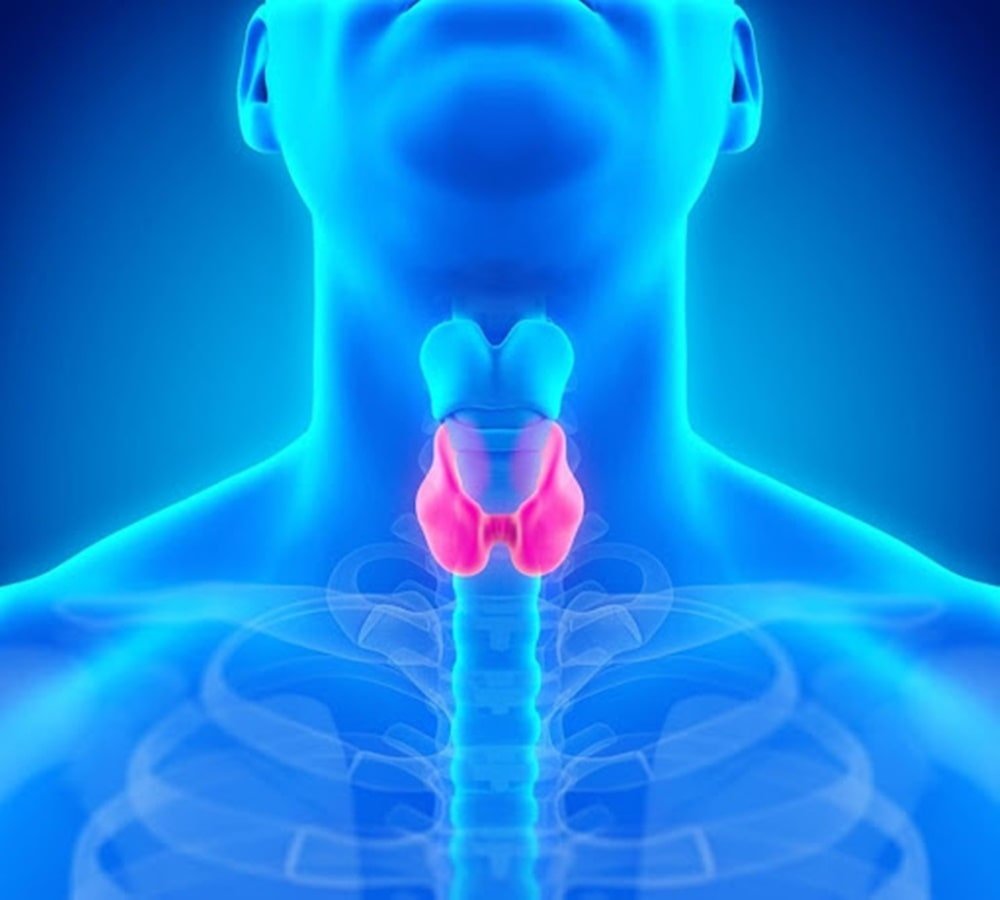
Did you know that thyroid hormones regulate the amount of energy your body produces through metabolism?
So, how does this occur, what happens if these hormones are unbalanced, and what controls them within the body?
Let’s take a tour through the lines of this article to answer all of these questions and more.
But first, how about learning more about the thyroid gland and its location.
What is the thyroid gland?
It is a small, butterfly-shaped gland located in the front of the neck, just below the laryngeal prominence (in men) or the larynx just above the collar bone.
It is a reddish-brown endocrine gland that contains blood vessels and nerves that are important for voice quality.
What exactly are thyroid hormones?
The thyroid gland secretes several vital hormones, including:
Thyroxin or Tetraiodothyronine (T4)
It is also known as the thyroid hormone, and it is the principal hormone produced by the gland, with a minor effect on metabolic rate.
It rapidly converts to T3 in the liver and other tissues, depending on different factors and diseases.
Triiodothyronine (T3)
It is the most active glycoprotein hormone in the body, accounting for 5% of total thyroid hormone circulating in the blood.
Calcitonin
It has a significant impact on calcium and phosphorus levels in the blood when they exceed the normal range.
What is globulin?
T3 and T4 hormones are carried in the blood by a protein called globulin, and once it has depleted, the amount of free hormones decreases.
It is worth noting that its deficiency causes no health problems, but its diagnosis can be confused with severe thyroid disorders.
What are the functions of thyroid hormones?
Thyroid hormones regulate metabolism and help to keep many body functions performing smoothly, such as:
- Calorie burn rate control.
- Digestion.
- Regulate the body temperature.
- Cardiac functions.
- Fertility.
- Skin protection.
- Body development.
Perhaps you are wondering, who controls these hormones?
How does the body regulate thyroid hormones?
The pituitary gland, located in the center of the skull below the brain, regulates the number of thyroid hormones in the bloodstream and thus controls the thyroid gland.
Whenever the pituitary gland detects a decrease or increase in thyroid hormone levels, it secretes a thyroid-stimulating hormone (TSH).
This hormone sends signals to the thyroid gland alerting it that its hormone levels need to be adjusted.
Thyroid disorders
When the thyroid gland fails to produce enough hormones, it indicates a medical condition that leads to a thyroid disorder.
Thyroid diseases are common and can affect anyone, including infants, as the following examples show:
Goiter
It is visible swelling in the neck caused by a lack of iodine; this causes the thyroid gland to work harder to produce thyroid hormones, causing it to enlarge.
Hyperthyroidism
This condition happens when the thyroid gland secretes a high amount of thyroid hormone, causing the body to use energy more quickly due to faster metabolism.
Causes of hyperthyroidism
Hyperthyroidism may happen due to a variety of factors, including:
- Graves disease, also known as exophthalmic goiter and is the most common cause of an autoimmune disorder.
- Overly active thyroid nodules.
- Elevation of iodine level (the major component of the hormones T3 and T4).
- Thyroiditis, which results in thyroid hormone leakage.
- Ovarian or testicular tumors.
- Thyroid and pituitary gland benign tumors.
- Intake of excessive amounts of tetraiodothyronine (T4) through supplements or medications.
Symptoms of hyperthyroidism
Hypermetabolism causes a variety of symptoms, including:
- Increased heart rate.
- Hypertension.
- Trembling hands.
- Insomnia.
- Excessive sweating.
- Weight loss.
- Menstrual disturbance in women.
- Exophthalmos (in Graves disease).
Hypothyroidism
It happens when the gland fails to produce enough hormones.
Therefore, the regular body functions slow down.
Symptoms of hypothyroidism
Signs and symptoms of hypothyroidism may vary from person to person.
Also, it depends on the severity of the condition and can be hard to identify sometimes.
In addition, a person may not realize that these changes are the result of a thyroid disorder until they manifest gradually over time.
These are the most common symptoms:
- Fatigue.
- Weight gain.
- Sensitive and puffy face.
- Constipation.
- Depression and memory issues.
- Dry skin and hair, in addition to lack of sweating.
- Bradycardia.
- Hypercholesterolemia.
- Muscle stiffness and weakness.
- Fertility and menstrual problems.
Causes of hypothyroidism
Conditions that cause deficiencies may include:
- Hashimoto’s Thyroiditis.
- Thyroiditis following childbirth.
- Iodine deficiency.
- Thyroidectomy surgery.
- Radiation therapy-induced damage.
Hashimoto’s Thyroiditis
The thyroid gland is mistakenly attacked and slowly destroyed by the immune system.
Chronic lymphocytic thyroiditis is another name for this condition.
In people with mild cases, no apparent symptoms may appear for years, and if they do, they mimic several symptoms of other gland diseases.
Thyroid cancer
It primarily occurs when abnormal thyroid gland cells begin to multiply and grow into a tumor.
It happens due to cell mutation or change.
Thyroid cancer, on the other hand, is one of the most treatable cancers if detected early.
Thyroid nodules
They are common and caused by the formation of lumps in the cells of the thyroid gland.
However, they rarely become cancerous.
These nodules can exist as a single one or as a group, and they can be solid or fluid-filled.
Furthermore, if they did not grow large enough to induce pressure on the trachea, the individual may remain unaware of their presence.
Thyroiditis
It is thyroid gland swelling or inflammation, resulting in either a deficiency or excess of thyroid hormone production.
Thyroid disorders in women
Women are more likely than men to develop thyroid disease.
One in every eight women will develop thyroid problems during their lifetime.
Thyroid problems can lead to:
Menstrual problems due to thyroid disorders
Because the thyroid gland helps regulate the menstrual cycle, having too much or too little thyroid hormones can cause menstruation to increase or decrease.
Amenorrhea is a condition in which your period stops for several months or longer due to these issues.
Pregnancy problems due to thyroid disorders
The thyroid gland affects ovulation in the same way that it affects menstruation.
Consequently, it may prevent conception.
It may also cause health problems for both the mother and her baby.
Hypothyroidism, which is frequently associated with pregnancy, can develop with age, most notably after menopause in women.
Diagnosis of thyroid diseases

Thyroid disease can be hard to identify at certain times because symptoms are similar to those of several other disorders.
Fortunately, some tests can help determine the diagnosis and the cause, such as the ones listed below:
Blood test
A thyroid test, which measures the amount of thyroid-related hormones in the blood, is one of the most commonly used methods for diagnosing thyroid disorders.
Also, your doctor may administer radioactive iodine by mouth or injection and then measure how much your thyroid gland absorbs.
Thyroid scan
The doctor examines the gland for changes in size, shape, or growth (nodules).
Ultrasound is another option, and it takes about 20 to 30 minutes.
Physical examinations
The doctor uses a simple, painless physical exam to check the neck for any growth or enlargement of the thyroid gland.
Is hyperthyroidism associated with weight gain?
Although an overactive thyroid gland correlates with weight loss, successful treatment can result in weight gain.
According to a study, some patients experienced a minor increase like regaining their pre-illness weight, whereas others attributed the significant increase to treatment.
For this reason, treatment for hyperthyroidism is identified as a risk factor of obesity.
Who is the most susceptible to thyroid diseases?
The following conditions may increase the likelihood of thyroid disease:
- A family history of thyroid disease.
- Taking an iodine-containing medication, such as Amiodarone.
- People over the age of 60, particularly women.
- Thyroid disease and treatment in the past, as well as cancer (thyroidectomy or radiation therapy).
- Some medical conditions, like:
- Pernicious anemia.
- Type 1 diabetes mellitus.
- Primary adrenal insufficiency.
- Lupus erythematosus.
- Rheumatoid arthritis.
- Sjögren syndrome.
- Turner syndrome.
Is it possible to prevent thyroid diseases?
In most cases, especially in developing countries, there is no way to prevent both hypothyroidism and hyperthyroidism.
For example, as previously mentioned, hyperactivity can develop due to consuming high doses of the hormone.
It could also happen by consuming a lot of iodine-containing foods, such as table salt and seafood.
However, you can avoid these complications by receiving a prompt diagnosis and following your doctor’s treatment plan.
In conclusion, it is highly recommended to seek medical attention as soon as possible if you experience any of the mentioned symptoms to detect any thyroid hormones disorders.